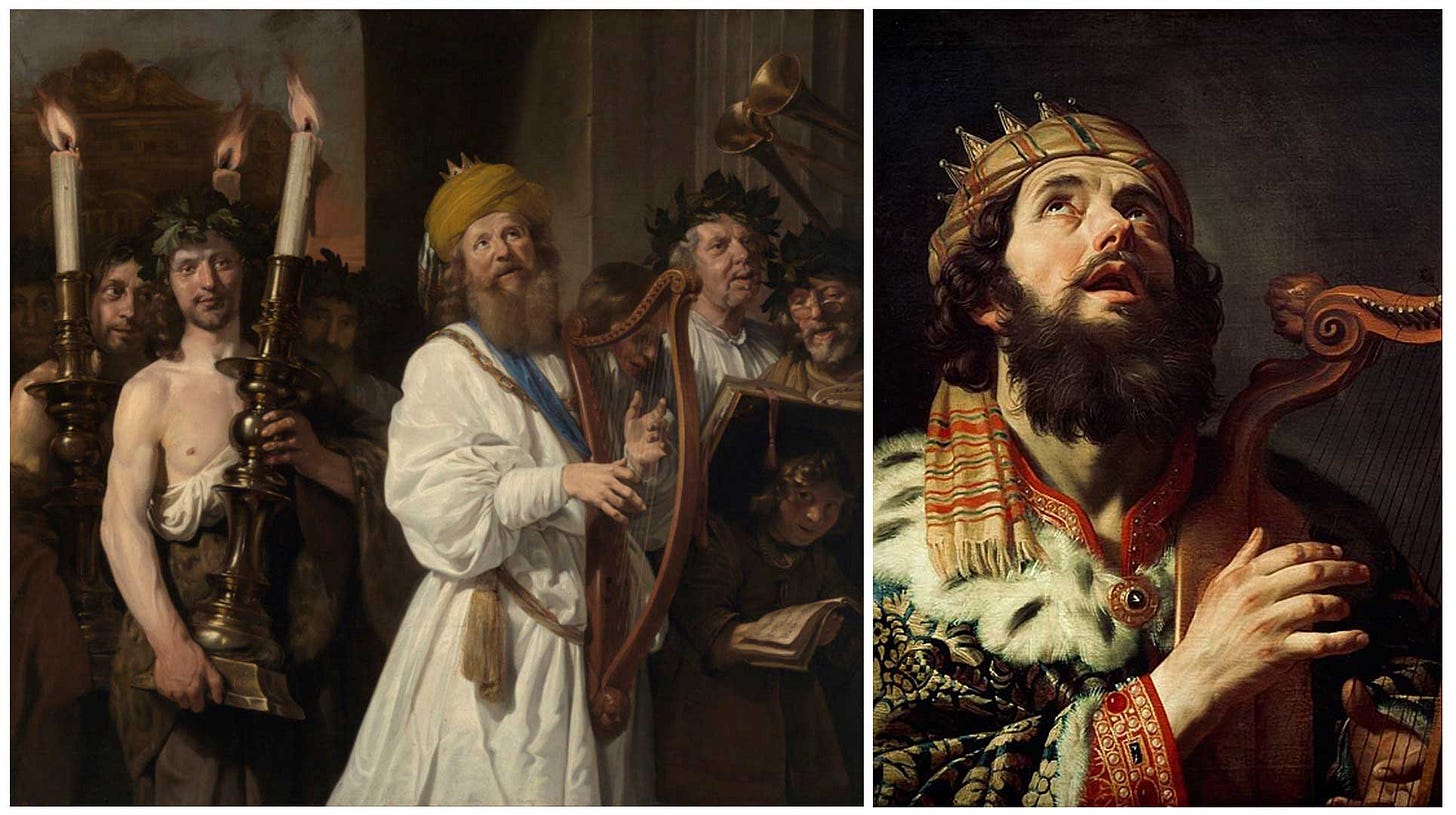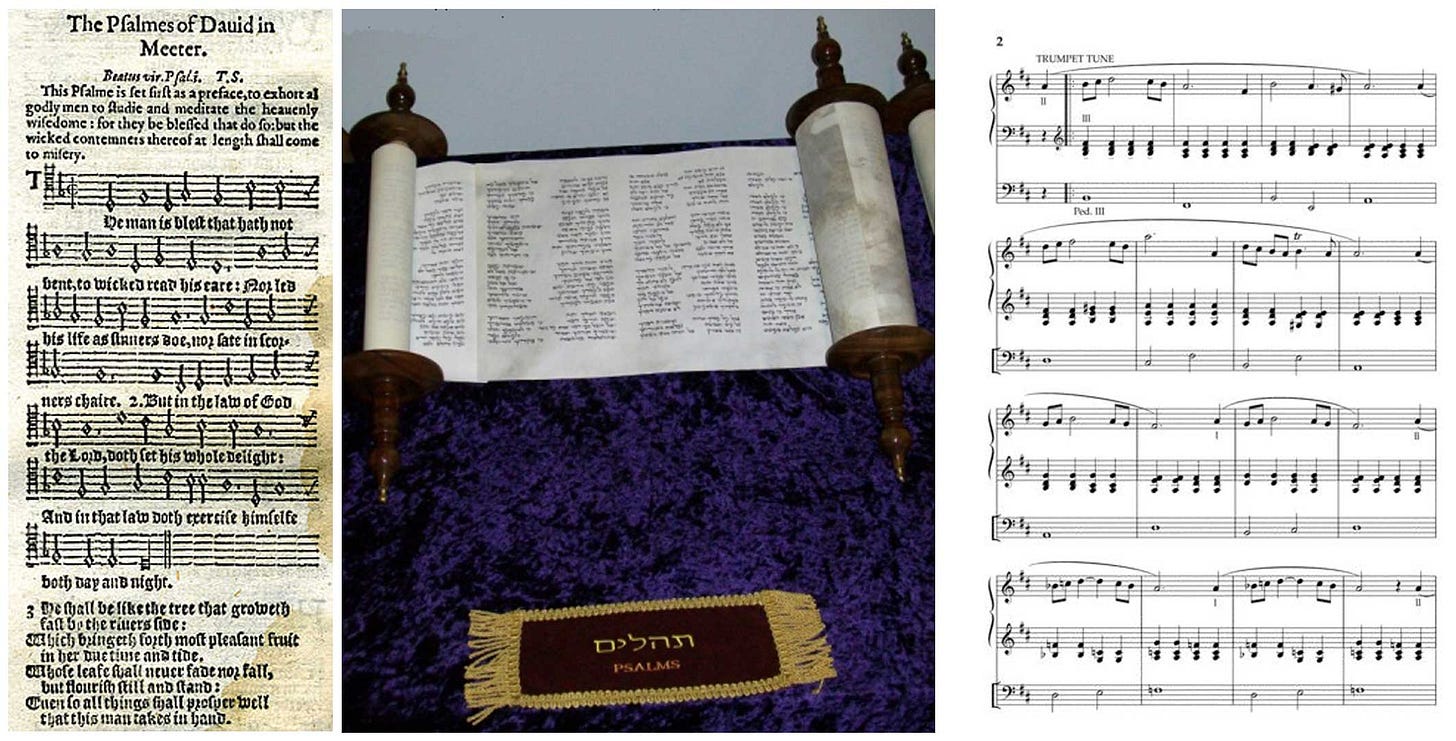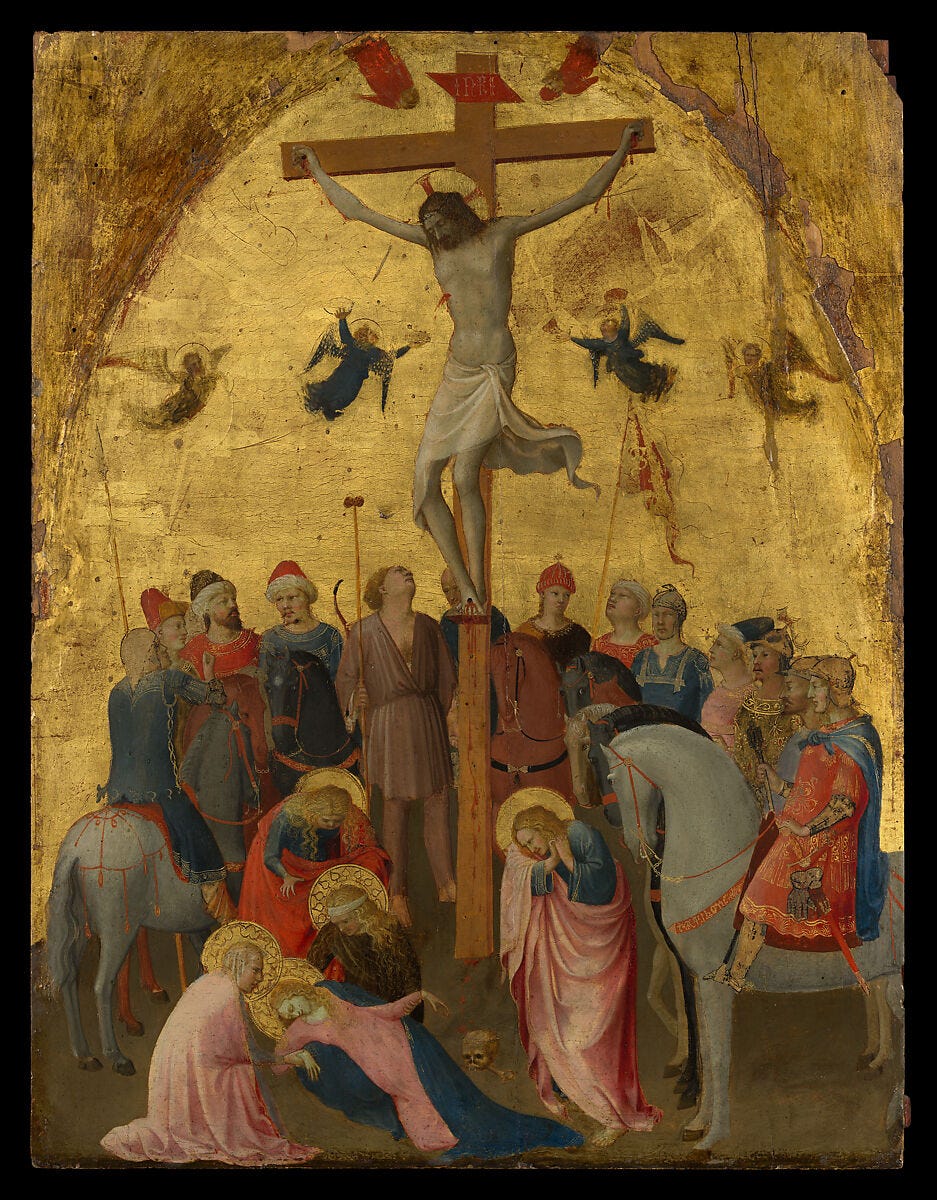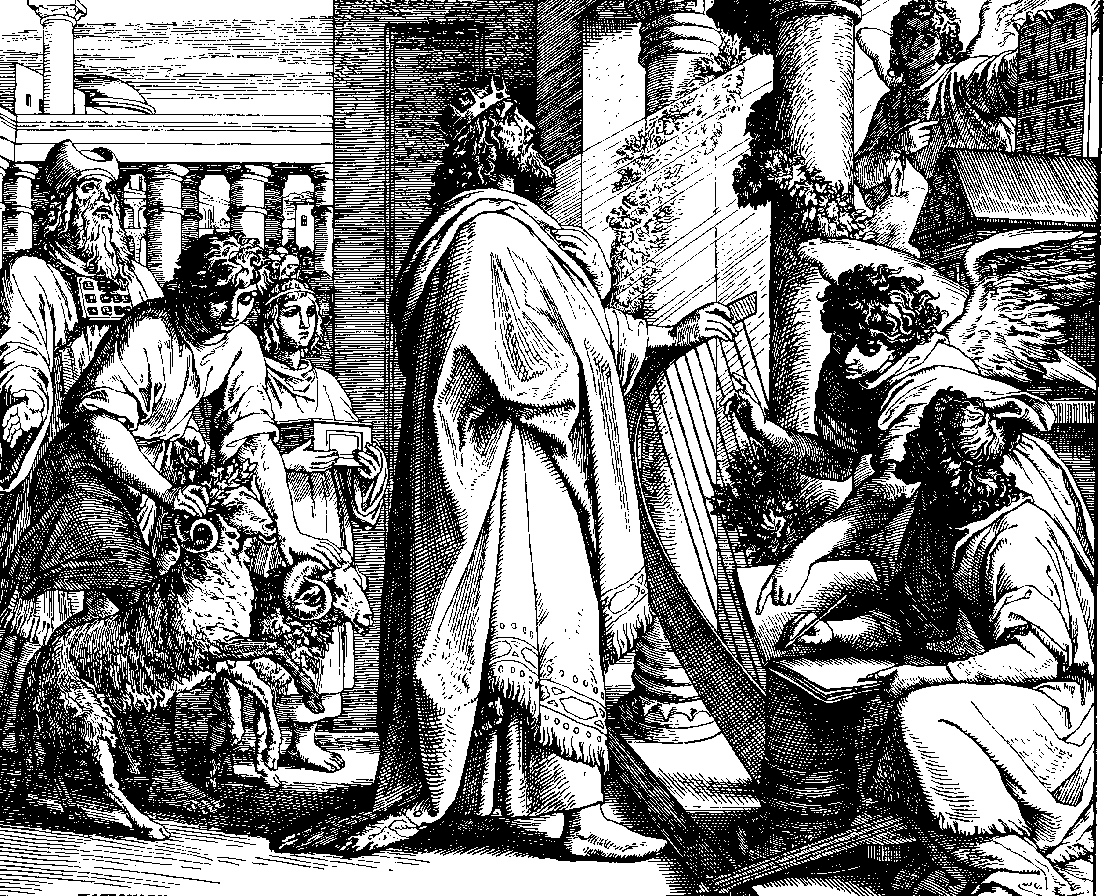DIVINE SONGS OF THE HEART – REACHING OUT TO GOD by Joan Foo Mahony in Hong Kong and an Easter Reflection by Fr. Joseph Tham LC in Rome
Smitten By Faith Issue # 00060 The Week before Easter, April 1st 2023
“… be filled with the Spirit, speaking to one another with psalms, hymns, and songs from the Spirit. Sing and make music from your heart to the Lord, always giving thanks to God…”
Paul in his Letter to the Ephesians 5:18-20
As Christians await with eager anticipation, the greatest feast of Easter coming soon next week, today’s article is about PSALMS which have an indelible and permanent place in Christian church services - singing and making music from our hearts to God. And, at Easter, our psalms become intense acclamations of thanksgiving to God. Today, I am very fortunate to receive a thoughtful reflection on Psalm 118 - a wonderful Easter psalm - by Fr. Joseph Tham LC from Rome.
Psalms are sung at masses in church. The music-making starts with the sonorous tolling of church bells followed by the rich sounds of the organ and then comes the melodious voices of the cantor and the stirring choir rising up in glorious joy. I think how lucky and blessed I am to be able to utter the words of God Himself in song – divine verses and melody which enable me to soar high up beyond the cathedral vaults - our voices reaching out to infinity and to God.
©Melanie Yeoh
Above : The lovely drawing of children singing psalms is by my friend, Dr. Melanie Yeoh, a young physician who lives and works with refugees in Kuala Lumpur and is able to reach out to teach children about her faith through her unique drawings. Melanie’s drawing of children singing psalms captures the joyful spirit of why we sing psalms.
Choirs singing psalms around the world
Left : The choir at the Cathedral of the Immaculate Conception in Hong Kong.
Centre : The choir at the Holy Family Church in Kajang, Malaysia
Right : The choir at St. Anne’s Church in Ponggol, Singapore
Each psalm is an individual song dedicated to God and written many thousands of years ago. While the exact authorship of some of the psalms is not known, we do know that many of the composers include tremendous biblical figures and prophets of the ancient world such as Melchizedek, Abraham, Moses, David and Solomon to name but a few – all blessed and inspired by God and given the grace to write His words. Of these, the attribution of the most number of psalms to the great King David is indisputable. Aside from David’s exploits in killing Goliath and saving the Kingdom of Israel and then ruling as the King of Israel for forty years, David wrote and sang so many psalms that he is also known as the “Sweet Singer of Israel”.
Right : King David playing the Harp by Gerard van Horthorst 1622
Left : David playing the harp by Jan de Bray 1670
To describe the genre and structure of psalms, I would say that most psalms are hymns and sung prayers of laments, prayers, reminiscence, faith, wisdom, praise and thanksgiving. Many psalms incorporate all of the above and they usually open with a lament and close with ringing praise. Psalms are devotional and totally unique because when we sing the psalms we express our love as we give voice to the living words of God; prayers in God’s own words. In the ‘Book of Psalms’ of the Old Testament, there is such a rich variety in the collection of 150 psalms that they are able to express almost every aspect of human emotion from utter distress to unbridled elation; the lyrical verses giving us inspiration and deepening our understanding of God.
Psalms are written in verse and set to music – the music illuminating the chanted prayers. The word ‘psalm’ comes from the Greek, ‘psalmos’ which means a song sung to the plucking of the strings of a harp. As for the number of instruments accompanying a psalm, today we usually have only one – either the organ or the piano. But Psalm 150 names at least nine musical instruments including the Jewish shofar, lyre, harp, drum, organ, flute, cymbal and trumpet. And the singing voice is surely a ‘musical’ instrument too. Altogether - in tuneful and pleasing harmony.
Even though the psalms of the Old Testament were written so many hundreds of centuries ago, they are as timeless and as relevant today in our 21st century and as beloved in every corner of the world in every language. With many archaic words and references in the psalms, we sometimes feel that we need to be a biblical scholar to understand the psalms. But, no. Even without a biblical literacy, all you really need is to open your heart, sing out the words of the psalms and let God speak to you in His own words.
Left : Page from Psalms of David
Middle : Jewish Scroll of a psalm
Right : Song sheet of a psalm
During the Covid Pandemic, a major casualty was the closure of churches and as a result of this, there were no more public masses and consequently no more choirs since singing was regarded as a Covid super-spreader activity ! It was heart-breaking. But we made do. Through various global lockdowns, we all made do with masses and singing on zoom in spite of inadequate online audios. For sure, we did not stop the music nor the singing.
So, today I would like to celebrate the imminent coming of Easter and share with my readers, some of my favourite Psalms : Psalms 22, 73 and 118. In the case of the last psalm - 118 - we have the beautiful reflection of Fr. Jospeh Tham LC.
PSALM 22 - THE GREAT LAMENT
The Crucifixion by Fra Angelico 1399-1455; tempera on wood, gold ground, at the Metropolitan Museum of Art, New York City
Perhaps the most famous lament ever is from Jesus Christ himself as in his anguish on the cross just before he dies, Jesus voices out the ancient Psalm 22 and cries out to God to save him :
“My God, my God why have you forsaken me.”
Note that Psalm 22 was first sung by King David centuries before even Jesus was born. But, as he hung on the cross, in his physical agony, Jesus prays the first words of this ancient psalm already known by heart from birth by every Jew in the Kingdom. Coming from Jesus, the words of Psalm 22 represent perhaps the most tormented and sorrowful cries of mankind - the fully human Jesus sharing the depths of our human emotions, even the inexorable pain of being ‘forsaken’ by God. Jesus whispers the first line of the psalm and this was enough. Jesus did not need to utter the rest of the poignant verses of psalm 22. On that terrible Good Friday, all who heard him already knew the rest of this sorrowful lament which then continues to be hopeful and then a beautiful paean of praise to God. When David composed Psalm 22 so many thousands of years ago, in his lament at the beginning, David was crying out on behalf of his desolate people of Israel. But then, the psalm becomes more hopeful as David then moves to prayer in the middle of the psalm and then in the last 10 verses David ends with exuberant praise and thanks to God. Just as the crucified Jesus dying on the cross did too - just as Jesus Christ was leading us to understand.
So, here are some extracts from this most poignant Psalm 22 :
My God, my God, why hast thou forsaken me?
Why art thou so far from helping me, and from the words of my roaring?
…….
Be not far from me; for trouble is near; for there is none to help.
….
But be not thou far from me, O Lord: O my strength, haste thee to help me.
…
I will declare thy name unto my brethren:
in the midst of the congregation will I praise thee.
…
My praise shall be of thee in the great congregation:
I will pay my vows before them that fear him.
The meek shall eat and be satisfied: they shall praise the Lord that seek him:
your heart shall live for ever.
All the ends of the world shall remember and turn unto the Lord:
and all the kindreds of the nations shall worship before thee.
For the kingdom is the Lord's: and he is the governor among the nations.
…
They shall come, and shall declare his righteousness unto a people that shall be born,
that he hath done this.”
PSALM 73 – THE PSALM OF ASAPH - A PSALM OF FAITH
David depicted as a Psalmist in a 1860 woodcut by Julius Schnorr von Karolsfeld
In Psalm 73, Asaph was probably one of the prophets and musicians in the Temple of Jerusalem during the time of King David. This psalm begins with the great lament of Asaph; he is filled with bitterness as he moans about the rich, wicked and Godless people who seem to be given so much in spite of their iniquity, compared to the poor God-fearing people like him who have nothing. He wails that this is enough to make him lose all faith in God. Asaph questions his devotion and commitment to God. But, then when he looks up; he manages to focus on God above and suddenly he is able to forget about all his lamentations and envy and God appears. By turning to God ; by not losing his faith - Asaph is able to understand and see his own tremendous good fortune – that God has not abandoned him; God is, in fact, walking side by side with him and holding him with his right hand.
So, far from having nothing – he has everything !
The psalm ends with joyous praise of God :
“ Whom have I in heaven but you ! And there is nothing on earth I desire besides you.”
Psalm 73 is a wonderful and exuberant psalm about faith. How with faith, God is enough. Here are some extracts from the Psalm 73, The Psalm of Asaph.
…..For I envied the arrogant
when I saw the prosperity of the wicked.They have no struggles;
their bodies are healthy and strong.
……..….This is what the wicked are like—
always free of care, they go on amassing wealth.Surely in vain I have kept my heart pure
and have washed my hands in innocence.
All day long I have been afflicted,
and every morning brings new punishments.…..When I tried to understand all this,
it troubled me deeply
till I entered the sanctuary of God;
then I understood their final destiny.….When my heart was grieved
and my spirit embittered,
I was senseless and ignorant;
I was a brute beast before you.Yet I am always with you;
you hold me by my right hand.
You guide me with your counsel,
and afterward you will take me into glory.Whom have I in heaven but you?
And earth has nothing I desire besides you.
My flesh and my heart may fail,
but God is the strength of my heart
and my portion forever. “
And finally, for Easter, here is the magnificent and glorious Psalm 118.
PSALM 118 – REJOICE - GOD’S STEADFAST LOVE ENDURES FOREVER
“This is the day that the Lord has made; let us rejoice and be glad in it.”
( Psalm 118:24)
With these jubilant words on Easter Sunday, all churches herald Easter and all Christians rejoice in the Resurrection. The congregation gives thanks for the gift of our Salvation and the choir sings out :
“O give thanks to the LORD, for he is good; his steadfast love endures forever!”
(Psalm 118:1).
Thousands of years ago and still today, Psalm 118 is embedded in the rich ancient Jewish history of Passover. This psalm is the traditional Passover Psalm of Thanksgiving – sung at every Passover meal for the Jews connecting them to the Exodus and their journey from exile in Egypt to the promised land.
“The stone that the builders rejected
has become the chief cornerstone.
This is the Lord’s doing; it is marvellous in our eyes.
….
This is the day that the Lord has made;
let us rejoice and be glad in it”
(Psalm 118: 22-24).
For Christians, the reference to the ‘cornerstone’ makes the psalm a messianic psalm. Theologians say that when Jesus celebrated the Last Supper with his disciples which was the day of the Passover, they would have sung this same Psalm 118 but, only Jesus himself would have known the full portent of the words of the psalm. Jesus knew that he was indeed the stone which would be rejected and he also knew that by his death and resurrection which would happen very soon, he would become the foundation of God’s building ; the rejected stone exalted to become the cornerstone of salvation – the Messiah.
“This is the Lord’s doing, and it is wonderful to see.”
(Psalm 118 : 23)
He was the sacrifice that was about to be given for the sins of all mankind.
©Allister Lee
Above : Fr Joseph Tham LC
Fr. Joseph Tham LC , a physician and the former Dean of the School of Bioethics at the Regina Apostolorum University in Rome ( where he still teaches ) is a profound and perceptive academic, theologian and recognized artist of Chinese calligraphy and paintings. Among his many writings and academic papers, he has written about the ‘cornerstone’. For this article, aside from quoting below from Fr. Tham’s book, ‘Art For God’, I have also asked Fr. Tham for his further reflections on the words of Psalm 118.
Seal by Fr. Joseph Tham LC – the Cornerstone; Extracted from Fr. Tham’s book, ‘Art For God’
The Cornerstone seal above first appeared in Fr. Joseph Tham LC’s book, ‘Art For God’ which was published and launched in Hong Kong in 2021 with a well-attended Exhibition of his brilliant calligraphy and Chinese paintings.
I asked Fr. Joseph Tham LC about the unique placement of the Chinese characters and the meaning of the words inside his ‘Cornerstone’ seal above. Fr. Tham said, “the Chinese seal -cornerstone- is a small stone seal that is often placed at the beginning of some writing. Though small, the cornerstone is not to be rejected or else the whole structure would crumble.” In the same way, “ Jesus is the cornerstone of society that is not to be left out, or else our civilization might implode.” Fr. Tham elaborates further and says that the seal may look small and insignificant but, just as in the case of many things in life – “ small truths and errors are important”.
As written in Psalm 118 :
“The stone that the builders rejected has become the chief cornerstone. This is the Lord’s doing; it is marvellous in our eyes.”
In his book, ‘Art For God’, Fr. Tham writes :
“ …often we forget and discard that which is most essential in our lives. At times, as we pursue success, wealth and different pleasures in life, we do not even realize what the most important things in life are. We might learn later in a hard way, after some crisis or difficulties; when we ask ourselves the deeper question of meaning and purpose.”
So, let us not take our Salvation for granted. Sing out the psalms; rejoice and give thanks at Easter; search hard for meaning and purpose in our lives; open our eyes to the awesome things Jesus has done for us and recognize how blessed we are !
ALLEUIA AND BLESSED EASTER TO ALL THE READERS OF SMITTEN BY FAITH !
[ Editor’s note : Joan Foo Mahony is asking all who read her article above to pray for Sixtine and Helene who are fighting for their lives in France after a terrible car accident. We are all united in faith and prayer for them. ]
____________________________________________________________________________
Editor’s Note :
Dear Reader, thank you for reading this edition of SMITTEN BY FAITH.
ALL articles in every issue are FREE.
For those of you who upgraded to be a PAID Subscribers for US$ 60.00 a year, thank you so much ! All proceeds go to the Regina Apostolorum Foundation to promote Catholic higher education.
PAID Subscribers will also receive via Bitly link ( see the posts pinned above available only to paid subscribers ) the digital copy of the recent book by Joan Foo Mahony, ‘LATE HAVE I LOVED THEE’ and THE COLLECTED ARTICLES, VOLUME ONE 2021 and the recent VOLUME TWO 2022 of Smitten By Faith, a DIGITAL COMPILATION of all the previous years’ 2021 and 2022 articles.
Paid Subscribers will also soon receive the Bitly link to full contents of ALL the Letters From Yangchow : Letters I to III.
For paid subscribers, simply click on the relevant Bitly links to receive the publications.
Paid Subscribers will also receive additional exclusive material from time to time.











